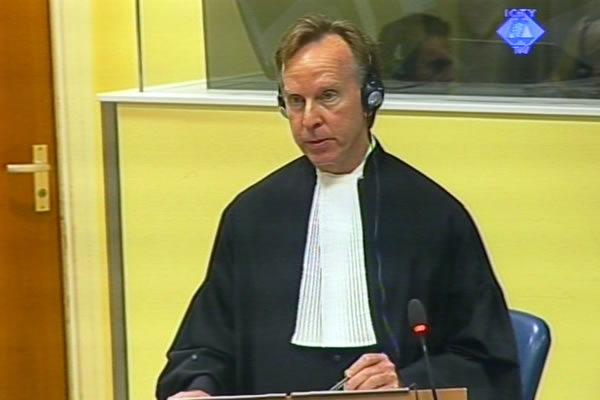Home
TRIBUNAL'S LAST TRIAL BEGINS
In the opening statement at the trial of Goran Hadzic the prosecution claimed it would prove that the former RSK president was responsible for the 'first ethnic cleansing campaign in the former Yugoslavia'. The ethnic cleansing was implemented through the gravest crimes against civilians whose 'only sin' was that they were non-Serbs and happened to live in the territory the accused and other participants of the joint criminal enterprise claimed as Serb
 Douglas Stringer, prosecutor at the Goran Hadzic trial
Douglas Stringer, prosecutor at the Goran Hadzic trial 'Today we present the last opening statement at the last trial before the Tribunal for the first crimes committed during the long years of conflict and desperation in the territory of what used to be a culturally rich and diverse country called Yugoslavia', prosecutor Douglas Stringer said at the opening of the trial of Goran Hadzic. Hadzic will stand trial for crimes perpetrated in Eastern Croatia, in the Serb Autonomous Region of Slavonia, Baranja and Western Srem (SBZS) while he served as the prime minister in the government of the self-proclaimed region from June 1991 to February 1992 and later as the president of the so-called Republic of Serbian Krajina until the end of 1993.
The prosecution described how Hadzic rose swiftly through the ranks from a storeman from the village of Pacetin near Vukovar to the president of the self-proclaimed Serb states and 'Slobodan Milosevic's main man in Croatia'. The prosecution's interest in Hadzic focuses primarily on his role in the joint criminal enterprise aimed at establishing ethnically clean Serb regions in Croatia. The enterprise was implemented through a great number of crimes, mostly against local Croats but also against Hungarians, Slovaks and members of other minorities. The Serbian president Milosevic was the 'most powerful personality' in the joint criminal enterprise. The enterprise also included Jovica Stanisic, Franko Simatovic, Mihalj Kertes, Zeljko Raznatovic Arkan, Milan Martic and others.
Goran Hadzic is charged in 14 counts with persecution, murder, extermination, torture, deportation, forcible transfer, looting and destruction of private property and religious buildings committed as part of the effort to ethnically cleanse the territories that were envisaged as Serb, although Croats often were in the majority there. This was the first ethnic cleansing campaign in the former Yugoslavia, the prosecution argued; other campaigns followed elsewhere. As part of that process, 180,000 persons were expelled from the territory of the SBZS. Their houses were looted and torched; in other instances, Serbs settled in their houses. The indictment lists the names of 348 Croats and members of other ethnic minorities who were killed. The JNA, local volunteers, the Territorial Defense and units 'imported' from Serbia - like 'Seselj's men' and 'Arkan's men' - participated in these crimes. Hadzic put up the imported units in the Training Center in Erdut.
The prosecutor described the 'widespread and systematic' nature of crimes and the 'consistent pattern of intimidation' of non-Serbs, highlighting it by several examples, such as the murder of 11 Croats and Hungarians in Arkan's Training Center in Erdut in early November 1991 and the murder of three other persons who had come to enquire about the fate of the first group of victims. The prosecution also mentioned the expulsion of Croats from Ilok, the detention and beating of Croats from Lovas and an incident in which prisoners were made to walk into a mine field on 18 October 1991: 21 civilians were killed. The gravest crime Hadzic is accused of is the murder of about 200 citizens of Vukovar at the Ovcara farm and the abuse and killing of 17 victims in Velepromet in Vukovar. The indictment also alleges crimes against persons deported from the territory of SBZS to Serbia and held there in prison facilities in inhumane conditions. Many prisoners were tortured and murdered there.
Hadzic 'didn't just look at those crimes from the sidelines’, the prosecution argued today. Hadzic planned, implemented and instigated the crimes, either through his direct actions or by failing to do anything to prevent or punish the perpetrators. The prosecution is convinced it would prove that Hadzic was well informed about the murders and ethnic cleansing. Hadzic confirmed it on various video recordings from that time that were played today in the courtroom.
The prosecutor insisted on Hadzic's physical proximity to Arkan and his fighters, and to their crimes. The government Hadzic headed and the training centre run by 'Arkan's men' were located in the same place - the winery in Erdut. The prisoners were beaten and murdered in the Training Center, right next door to the building where Hadzic sat in his office as the prime minister.
At the end of the opening statement, the prosecution recalled that the RSK 'disappeared' in 1995 after the two Croatian military operations, Flash and Storm, and the peaceful reintegration of Eastern Slavonia. Although this marked the end of the plans hatched by Hadzic and his fellow fighters to create an ethnically clean Serb entity within Croatia, their failed attempt resulted in numerous crimes. At the end of its case, the prosecution will call for the conviction of the former SBZS prime minister and RSK president on all 14 counts in the indictment.
After the prosecution completed the opening statement, the judge said the defense wouldn't present its opening statement at that time and that the accused Hadzic would not address the Trial Chamber without making a solemn declaration, although he had the right to do it. The prosecution then proceeded to call its first witness, Zlatko Antunovic from Dalj.
Linked Reports
- Case : Hadzic
- 2012-10-15 FINAL PREPARATIONS FOR HADZIC TRIAL COMPLETED
- 2012-09-13 GORAN HADZIC’S TRIAL TO OPEN ON 16 OCTOBER
- 2012-06-21 141 PROSECUTION WITNESSES TO TESTIFY AT GORAN HADZIC’S TRIAL
- 2012-10-17 ‘THERAPY SESSIONS’ IN DALJ PRISON
- 2012-10-18 HOW HADZIC DECIDED TO GO TO WAR WITH CROATS
- 2012-10-19 ‘NO CONDITIONS FOR RETURN, BUT NO EFFORT TO PUT THEM IN PLACE’
